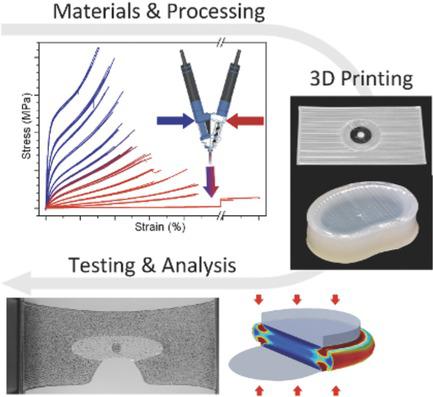当前位置:
X-MOL 学术
›
Adv. Mater.
›
论文详情
Our official English website, www.x-mol.net, welcomes your feedback! (Note: you will need to create a separate account there.)
3D Printing of Materials with Tunable Failure via Bioinspired Mechanical Gradients
Advanced Materials ( IF 29.4 ) Pub Date : 2018-01-16 , DOI: 10.1002/adma.201705808 Dimitri Kokkinis 1 , Florian Bouville 1 , André R. Studart 1
Advanced Materials ( IF 29.4 ) Pub Date : 2018-01-16 , DOI: 10.1002/adma.201705808 Dimitri Kokkinis 1 , Florian Bouville 1 , André R. Studart 1
Affiliation

|
Mechanical gradients are useful to reduce strain mismatches in heterogeneous materials and thus prevent premature failure of devices in a wide range of applications. While complex graded designs are a hallmark of biological materials, gradients in manmade materials are often limited to 1D profiles due to the lack of adequate fabrication tools. Here, a multimaterial 3D‐printing platform is developed to fabricate elastomer gradients spanning three orders of magnitude in elastic modulus and used to investigate the role of various bioinspired gradient designs on the local and global mechanical behavior of synthetic materials. The digital image correlation data and finite element modeling indicate that gradients can be effectively used to manipulate the stress state and thus circumvent the weakening effect of defect‐rich interfaces or program the failure behavior of heterogeneous materials. Implementing this concept in materials with bioinspired designs can potentially lead to defect‐tolerant structures and to materials whose tunable failure facilitates repair of biomedical implants, stretchable electronics, or soft robotics.
中文翻译:

通过生物启发性的机械梯度可3D打印具有可调失效的材料
机械梯度可用于减少异质材料中的应变失配,从而防止器件在广泛的应用中过早失效。虽然复杂的渐变设计是生物材料的标志,但由于缺乏足够的制造工具,人造材料中的梯度通常仅限于一维轮廓。在这里,开发了一种多材料3D打印平台来制造弹性模量,其弹性模量跨越三个数量级,并用于研究各种生物启发的梯度设计在合成材料的局部和整体力学行为中的作用。数字图像相关数据和有限元建模表明,可以有效地使用梯度来控制应力状态,从而规避缺陷丰富界面的削弱作用或对异质材料的失效行为进行编程。在具有生物启发性设计的材料中实施此概念可能会导致容错结构,并导致其可调性故障有助于修复生物医学植入物,可拉伸电子器件或软机器人的材料。
更新日期:2018-01-16
中文翻译:

通过生物启发性的机械梯度可3D打印具有可调失效的材料
机械梯度可用于减少异质材料中的应变失配,从而防止器件在广泛的应用中过早失效。虽然复杂的渐变设计是生物材料的标志,但由于缺乏足够的制造工具,人造材料中的梯度通常仅限于一维轮廓。在这里,开发了一种多材料3D打印平台来制造弹性模量,其弹性模量跨越三个数量级,并用于研究各种生物启发的梯度设计在合成材料的局部和整体力学行为中的作用。数字图像相关数据和有限元建模表明,可以有效地使用梯度来控制应力状态,从而规避缺陷丰富界面的削弱作用或对异质材料的失效行为进行编程。在具有生物启发性设计的材料中实施此概念可能会导致容错结构,并导致其可调性故障有助于修复生物医学植入物,可拉伸电子器件或软机器人的材料。



























 京公网安备 11010802027423号
京公网安备 11010802027423号